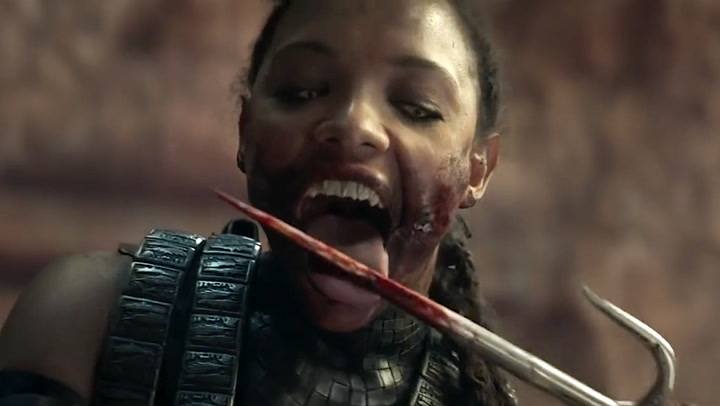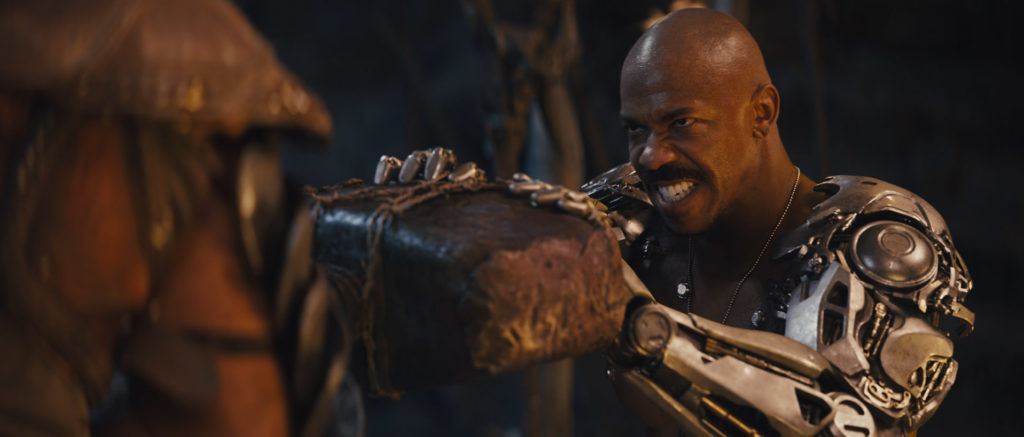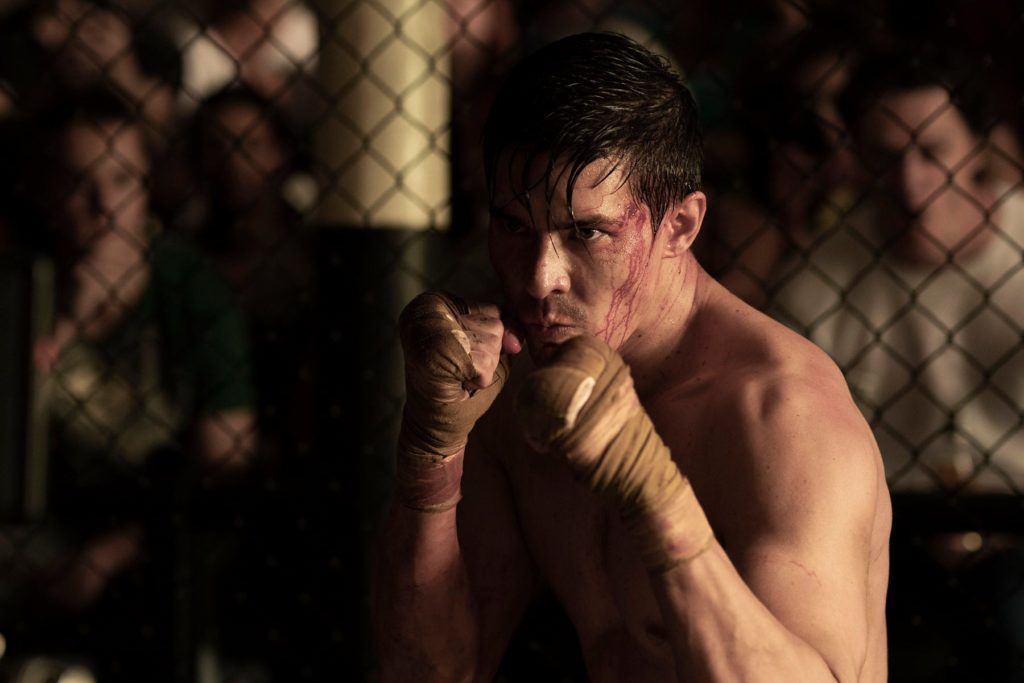When you first think of the Mortal Kombat video game franchise, what comes to mind? Gory death scenes? Sure! Intense fighting and graphics? But of course! “FATALITY!”? Bruuuuuh! Well what about the franchise’s captivating storylines? Producers James Wan (Aquaman), Todd Gardner (13 Going on 30), and director Simon McQuiod are putting storytelling on equal footing with visuals with their upcoming live-action reboot of Mortal Kombat, starring Lewis Tan, Jessica McNamee, Mehcad Brooks, and Sisi Stringer.
Judging by our interview and the first 13 minutes of the film, it’s clear Mortal Kombat is poised to do exactly that when it premieres on April 16 in theaters and on HBO Max.
A Complex Mythology
Mortal Kombat has one of the richest mythologies of any game-rooted media property. While the core of the story centers around an inter-dimensional fighting tournament where warriors from different worlds battle for their realm’s survival, it’s the individual character arcs that ground the mythos.
The hero’s journey of Liu Kang, Shao Kahn’s brutal takeover of Edenia, and the deadly “sibling” rivalry of princesses Kitana and Mileena are just some of the foundational plotlines of the MK universe. With each new iteration in the franchise, new characters and deeper world building enrich a tale that spans entire worlds, dimensions, and even time itself.

Story is Key
That rich storytelling was barely a footnote when Mortal Kombat’s violent gameplay became a cultural flashpoint in the early 1990s. Congressional hearings, parental outrage, and an eventual game rating system overshadowed the intricate narrative game writers were laying out. As the controversy died down, players were given space to appreciate Mortal Kombat’s explosive storytelling.
“It’s been over 25 years since the first feature film came out, and fans have been pretty vocal asking for another big screen entry,” said producer James Wan. “As a fan myself of the games and movies, I, too, wanted to see another theatrical version of this, and felt it was time again to revisit this IP that has been kept relevant in the game world but not as much in the feature world.”

Now nearly 30 years later, the MK universe has grown to include countless games, two 90s live-action movies, a defanged kid’s cartoon (starring Cree Summer!), web series, animated films, and more. The new live-action reboot aims to honor that deep narrative tradition by putting story squarely on par with visuals (including MK’s trademark goriness).
“I’ve blown a ton of shit up in movies,” said producer Todd Garner. “When a movie doesn’t stand the test of time and gets knocked on, it’s because [the fans] don’t care. I’m sure you’ve seen 100 movies where you’re like, ‘OK wow! They blew everything up, but I didn’t care about anybody. I didn’t really care about the story. I didn’t care about the characters.’ Then you see movies with a budget of about $4, where you’re dying because you’re so worried the character’s gonna get hurt. You’re so scared because you love that character!”

He’s not wrong. The most beloved action films aren’t driven solely by explosions and fight sequences. They’re driven by the personal stakes that propel characters into that action. Compare classics like John Wick and Die Hard, action flicks centered around men grieving the loss/potential loss of a spouse (and dog in John’s case), to the direct-to-DVD drivel churned out by the likes of Steven Segal (no shade, Steven). See the difference?
“What I’ve set out to do from the get-go, was to make a gigantic, epic, beautiful, cinematic, respectful experience of the DNA of Mortal Kombat and of what people love about it,” said first-time movie director Simon McQuiod. “Our goal, was to make a film that paid respect and elevated Mortal Kombat to a new place.”
Naturally, there will be comparisons to the 90s Mortal Kombat films starring Robin Shou and Talisa Soto, but Simon & Co. aren’t stressed out about that. “This film does not even try to attempt to cover what [original live-action series] had going for it back in the day, said McQuiod. “It’s a new, elevated cinematic experience of a beloved title.”
A 10-Year Journey
One reason why the team behind Mortal Kombat was so intent on crafting a well-rounded film was because of how long it took to get it developed. Producer Todd Garner said it took around 10 or so years to get the movie made, which in Hollywood isn’t so unheard of. By the time it was greenlit, Garner had elevated in his life and his art.

“Once the material shit is taken away and all that, you care about your family, you care about the people you love, you care about your friends, you care about your own health and well-being. That’s the most important thing to me. I want to make movies about characters,” Garner said. “I mean yeah, we can rip out people’s hearts and beat the shit out of people, and throw people around, but if you don’t care about them, they might as well be red shirts on Star Trek.”
Echoing Garner’s sentiment, director McQuiod said, “I just want it to mean something because I know it means something to fans. I didn’t want it to just feel throw away like, ‘Oh, they don’t care.’ That first 12-13 minutes was an attempt to give it some substance at the foundations so you could sit there as a superfan and think, ‘Oh my god! Someone gave a shit!’”
The First (EPIC) 13 Minutes
Note: This next section describes the first 13 minutes of Mortal Kombat. Mild spoilers ahead.
Longtime Mortal Kombat fans understand the feud between MK rivals Scorpion and Sub-Zero, but the filmmakers decided to give us a refresher. The film kicks off in feudal Japan as swordsman Hanzo Hasashi (Hiroyuki Sanada) and his family enjoy a typical day. Hanzo and his young son return from fetching water as his wife tends to their garden and their baby lies inside their guarded home. As the son tends to his crying sibling, Hanzo expresses his love for his wife in a way that would make even the biggest cynic tear up. It’s a brief, yet tender moment that eats away at any OG Mortal Kombat fan who knows what’s about to happen next.

When Hanzo heads back to fetch more water, warriors from the rival Lin Kuei clan, led by Sub-Zero (Joe Taslim), sneak onto Hanzo’s estate and quickly dispatch with the family’s guards. Trapped inside, Hanzo’s wife and son hide their baby just before Sub-Zero enters. By the time Hanzo returns, he’s too late. His wife and son are dead, their bloodied bodies frozen as grotesque statues.
Hanzo’s grief here is palpable, with much of that credit going to Sanada’s ability to convey grief, wrapped in strength. But then it’s time for an epic fight-to-the-death battle between Hanzo (aka Scorpion) and the deadly Sub-Zero. When it’s all over, Hanzo is presumably sent to Hell, Sub-Zero leaves the victor, and Hanzo’s hidden baby is left for dead. Or are they…?
So, will Mortal Kombat live up to the hype and will audiences be as satisfied by its reinforced storytelling as they are with its likely superior graphics and fight sequences? Find out for yourself when Mortal Kombat premieres in theaters and on HBO Max streaming on April 16.
Want to get Black Nerd Problems updates sent directly to you? Sign up here!
Follow us on Twitter, Facebook and Instagram!


Show Comments